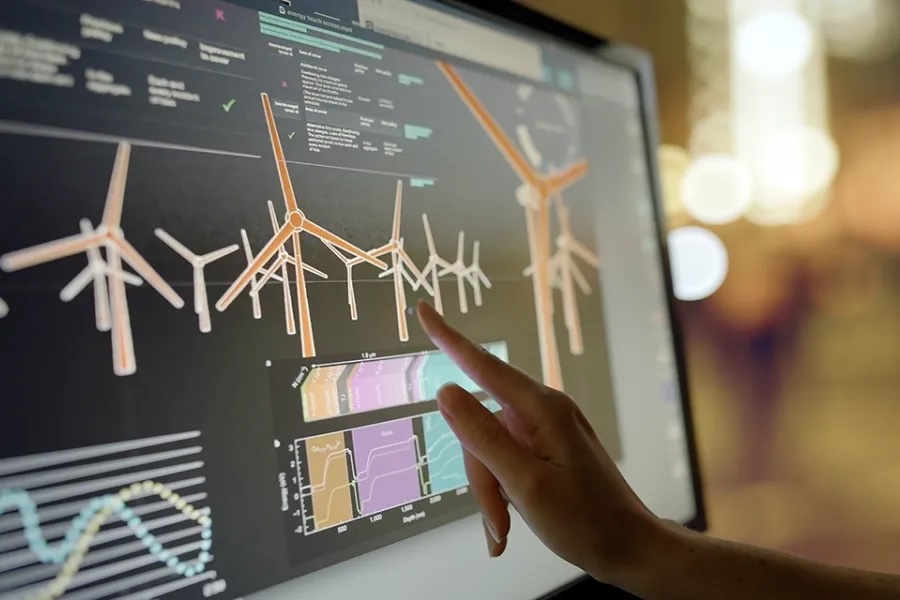At the Forefront of Energy and AI
SCS Faculty Are Tackling Some of Society's Toughest Challenges While Pioneering Solutions for Tomorrow
Wednesday, July 16, 2025

 CMU thrives at the intersection of AI, innovation and energy, and world-class researchers in the School of Computer Science are tackling some of society's toughest challenges while pioneering new solutions for tomorrow.
CMU thrives at the intersection of AI, innovation and energy, and world-class researchers in the School of Computer Science are tackling some of society's toughest challenges while pioneering new solutions for tomorrow.
Learn more about this research in four important areas and why that work matters.
Meeting AI Energy Demand
AI and Its Growing Energy Demand
AI models like ChatGPT have exploded in both use and capabilities over the past few years, leading to an increase in demand for and spending on the data centers that power them. These data centers use huge amounts of electricity. Zico Kolter, professor and head of CMU's Machine Learning Department (MLD), explores why AI models use so much electricity, what's driving the rapid increase in demand, and if what AI can do will be worth the cost of the power it requires.
Sustaining AI Growth Needs Energy and Carbon-Efficient Computing Infrastructure
AI's growing energy consumption could destabilize the grid and undermine climate goals unless we fundamentally shift from optimizing only for performance to optimizing for energy and carbon efficiency, too. Yuvraj Agarwal, a professor in the Software and Societal Systems Department (S3D), outlines ways policymakers and researchers can sustain AI's transformative benefits while reducing its grid and climate impact.
How AI Can Unlock Fusion Energy
Some of the world's biggest challenges are at heart energy problems. Providing people with food and clean water requires energy. The biggest contributor to climate change is being unable to generate sufficient energy without unwanted side effects. Nuclear fusion could solve these problems. Robotics Institute (RI) Research Professor Jeff Schneider discusses how CMU researchers are using AI to unlock the promise of unlimited, clean energy from fusion.
Open Source AI May Reduce Energy Demands
There's growing evidence that AI design and implementation choices have a profound impact on energy usage. Hoda Heidari, the K&L Gates Career Development Assistant Professor in Ethics and Computational Technologies in MLD, joins CMU colleagues Sayeed Choudhury, Tori Qiu and Keith Webster in explaining how the university's Openness in AI framework provides the transparency that could optimize energy consumption and lead to more efficient AI models and technologies.
Maximizing Sustainability and Protecting Communities
Building Public Trust: Developing a Framework for Measuring and Reporting the Impacts of AI
As AI becomes more capable and integrated into the U.S. economy, its growing demand for resources drives significant economic and environmental costs. Emma Strubell, the Raj Reddy Assistant Professor in the Language Technologies Institute, joined forces with Tamara Kneese of the Data and Society Research Institute to outline how we can shape a future where AI infrastructure can be developed sustainably and in a way that responds to the needs of local communities.
Boosting Cybersecurity and Defense
Securing the Future of Robotics and Autonomous Systems
Robotics and autonomous systems will soon be ubiquitous in America's industrial infrastructure, but they're just as susceptible to privacy and security threats as existing online systems. SCS faculty members Eunsuk Kang (S3D) and Sarah Scheffler (S3D), RI Systems Scientist Christopher Timperley and College of Engineering faculty member Limin Jia discuss how CMU's CyLab Robotics Security and Privacy Initiative fosters a future where autonomous systems are not just innovative, but also safe, reliable, private and trustworthy.
Accelerating Innovation and Discovery
AI Materials Design: Enabling the Next Generation of U.S. Energy Infrastructure
AI will revolutionize how new materials are discovered and deployed, a shift that has the potential to speed up the development of novel materials necessary for the future U.S. energy infrastructure. Strubell and Materials Science and Engineering Department colleagues Elizabeth Dickey and Mohadeseh Taheri-Mousavi outline CMU's expertise in materials design and manufacturing research and how that expertise can accelerate the development of efficient, secure and sustainable materials solutions across the energy sector.
Carnegie Foundry: Bringing AI, Robotics and Energy Innovations to Market
Successfully delivering world-leading AI, autonomous robotics, energy innovation and deep tech from research to the market requires a fast, scalable and proven approach. Jeff Legault, associate director of the RI's National Robotics Engineering Center, joins Carnegie Foundry venture studio colleagues Rich Fruehauf, Rob Szczerba and Michael Lutzky to share how their model bridges the commercialization gap by de-risking deep-tech solutions, shortening development timelines and scaling innovation.
For more information about CMU's research in AI, energy and more, visit the university's Energy and Innovation website.